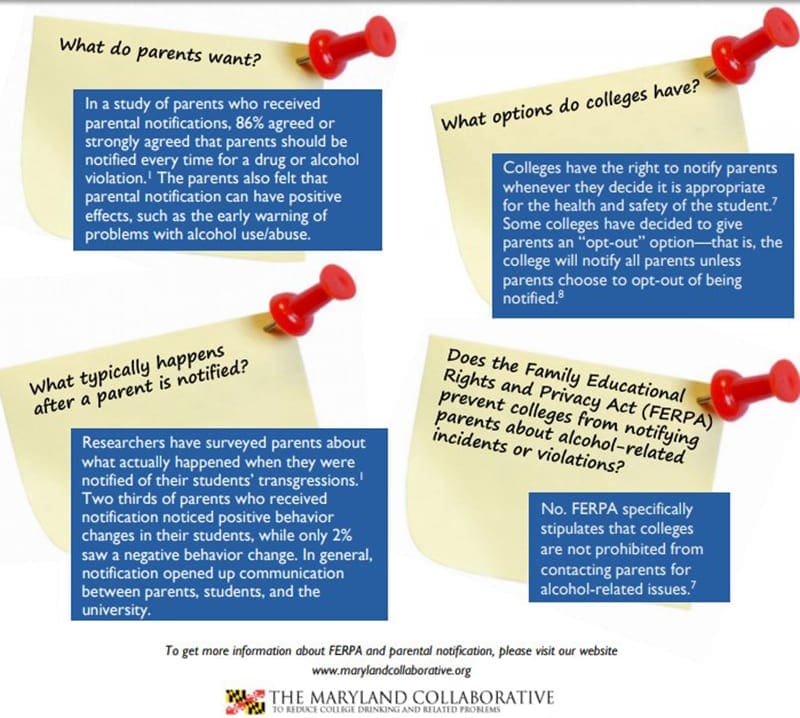Parental Notification: Considerations for College Administrators
Deciding when and how to notify a parent when their college-aged child has been involved in an alcohol-related incident can be challenging for college administrators. The desire is strong to foster students’ development of adult qualities like independence and personal responsibility, but it might be at odds with a competing need to promote the safety of all students. Many college administrators have adopted a policy of notifying parents at the first alcohol violation or alcohol-related incident, and their experiences align with recent research suggesting that parental notification can facilitate constructive parent-child conversations and mitigate more serious alcohol involvement.1 This is unsurprising because of clear research evidence that parents have an enduring influence on their child’s alcohol drinking behaviors, even during college.2-6 Understandably, colleges vary in their approaches to parental notification policies. This fact sheet highlights some key issues for administrators to consider in relation to such policies.
References:
- Cosden M, Hughes JB. Parents’ perspectives on parental notification of college students’ alcohol use. Journal of Student Affairs Research and Practice. 2012;49(1):51-64.
- Small ML, Morgan N, Abar C, Maggs JL. Protective effects of parent-college student communication during the first semester of college. Journal of American College Health.2011;59(6):547-554.
- Abar C. Examining the relationship between parenting types and patterns of student alcohol related behavior during the transition to college. Psychology of Addictive Behaviors. 2012;26(1):20-29.
- Abar C, Abar B, Turrisi R. The impact of parental modeling and permissibility on alcohol use and experienced negative drinking consequences in college. Addictive Behaviors. 2009;34(6-7):542-547.
- Turrisi R, Ray AE. Sustained parenting and college drinking in first-year students. Developmental Psychobiology. 2010;52(3):286-294.
- Labrie JW, Sessoms AE. Parents still matter: The role of parental attachment in risky drinking among college students. Journal of Child and Adolescent Substance Abuse. 2012;21(1):91-104.
- United States Department of Education. The Family Educational Rights and Privacy Act:Guidance for eligible students. 20 U.S.C. § 1232g; 34 CFR Part 99. 2011. Available at https://www2.ed.gov/policy/gen/guid/fpco/ferpa/for-eligible-students.pdf.
- Seaquist G, Barken M. Telling your parents you’re drinking too much-FERPA’s parental notification exception. North East Journal of Legal Studies. 2010;23:19-30.
Parental Notification: Considerations for College Administrators
Deciding when and how to notify a parent when their college-aged child has been involved in an alcohol-related incident can be challenging for college administrators. The desire is strong to foster students’ development of adult qualities like independence and personal responsibility, but it might be at odds with a competing need to promote the safety of all students. Many college administrators have adopted a policy of notifying parents at the first alcohol violation or alcohol-related incident, and their experiences align with recent research suggesting that parental notification can facilitate constructive parent-child conversations and mitigate more serious alcohol involvement.1 This is unsurprising because of clear research evidence that parents have an enduring influence on their child’s alcohol drinking behaviors, even during college.2-6 Understandably, colleges vary in their approaches to parental notification policies. This fact sheet highlights some key issues for administrators to consider in relation to such policies.
References:
- Cosden M, Hughes JB. Parents’ perspectives on parental notification of college students’ alcohol use. Journal of Student Affairs Research and Practice. 2012;49(1):51-64.
- Small ML, Morgan N, Abar C, Maggs JL. Protective effects of parent-college student communication during the first semester of college. Journal of American College Health.2011;59(6):547-554.
- Abar C. Examining the relationship between parenting types and patterns of student alcohol related behavior during the transition to college. Psychology of Addictive Behaviors. 2012;26(1):20-29.
- Abar C, Abar B, Turrisi R. The impact of parental modeling and permissibility on alcohol use and experienced negative drinking consequences in college. Addictive Behaviors. 2009;34(6-7):542-547.
- Turrisi R, Ray AE. Sustained parenting and college drinking in first-year students. Developmental Psychobiology. 2010;52(3):286-294.
- Labrie JW, Sessoms AE. Parents still matter: The role of parental attachment in risky drinking among college students. Journal of Child and Adolescent Substance Abuse. 2012;21(1):91-104.
- United States Department of Education. The Family Educational Rights and Privacy Act:Guidance for eligible students. 20 U.S.C. § 1232g; 34 CFR Part 99. 2011. Available at https://www2.ed.gov/policy/gen/guid/fpco/ferpa/for-eligible-students.pdf.
- Seaquist G, Barken M. Telling your parents you’re drinking too much-FERPA’s parental notification exception. North East Journal of Legal Studies. 2010;23:19-30.


